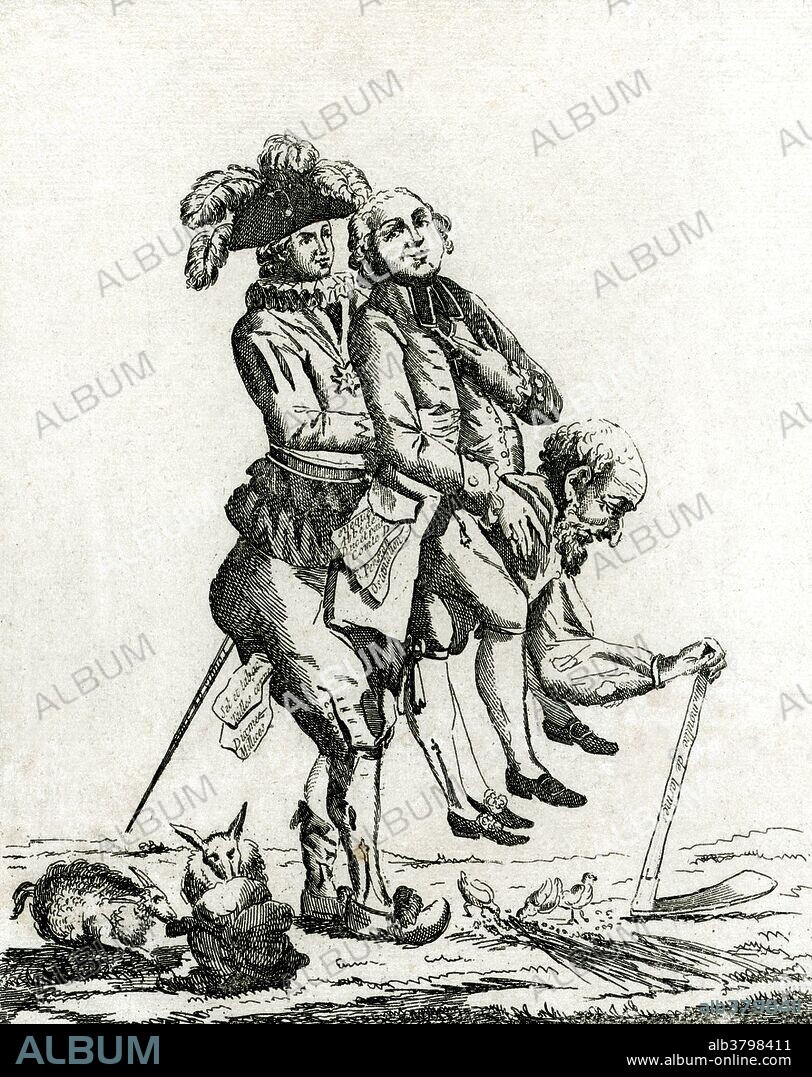alb3798411
French Revolution, Estates-General of 1789

|
Ajouter à une autre Lightbox |
|
Ajouter à une autre Lightbox |



Avez-vous déjà un compte? S'identifier
Vous n'avez pas de compte ? S'inscrire
Acheter cette image.
Sélectionnez l'usage:

Titre:
French Revolution, Estates-General of 1789
Légende:
Traduction automatique: Intitulé : « A faut espérer q'eu se jeu la finira bentot ». Montre la noblesse et le clergé, représentant les états généraux, chevauchant le dos d'un homme représentant la classe ouvrière ou le tiers état ; l'homme est courbé sous leur poids et se soutient en s'appuyant sur un outil en forme d'herminette, tandis qu'autour de ses pieds oiseaux et lapins se régalent du produit de son travail. Les États généraux de 1789 furent la première réunion depuis 1614 des États généraux français, une assemblée générale représentant les domaines français du royaume : le clergé (Premier État), les nobles (Deuxième État) et le peuple (Troisième État). Domaine). Convoqués par le roi Louis XVI pour proposer des solutions aux problèmes financiers de son gouvernement, les États généraux siégèrent plusieurs semaines en mai et juin 1789 mais se retrouvèrent dans une impasse sur le premier point de l'ordre du jour : devait-il voter par succession, en donnant le premier deux domaines un avantage, ce qui était le choix du roi, ou voter tous ensemble, donnant l'avantage au Tiers État. Elle prit fin lorsque le Tiers État se transforma en Assemblée nationale, invitant les deux autres à la rejoindre, contre la volonté du roi, signalant le déclenchement de la Révolution française. Aucun artiste crédité, daté 1789
Entitled: "A faut esperer q'eu se jeu la finira bentot." Shows the nobility and the clergy, representing the estates general, riding on the back of a man representing the working class, or third estate; the man is bent under their weight and supports himself by leaning on an adz-like tool, while around his feet birds and rabbits feast on the produce of his labor. The Estates-General of 1789 was the first meeting since 1614 of the French Estates-General, a general assembly representing the French estates of the realm: the clergy (First Estate), the nobles (Second Estate), and the common people (Third Estate). Summoned by King Louis XVI to propose solutions to his government's financial problems, the Estates-General sat for several weeks in May and June 1789 but came to an impasse over the first item on the agenda: whether they should vote by estate, giving the first two estates an advantage, which was the king's choice, or vote all together, giving the Third Estate the advantage. It was brought to an end when the Third Estate formed into a National Assembly, inviting the other two to join, against the wishes of the king, signaling the outbreak of the French Revolution. No artist credited, dated 1789.
Crédit:
Album / LOC/Science Source
Autorisations:
Modèle: Non - Propriété: Non
Questions sur les droits?
Questions sur les droits?
Taille de l'image:
3331 x 4200 px | 40.0 MB
Taille d'impression:
28.2 x 35.6 cm | 11.1 x 14.0 in (300 dpi)
 Pinterest
Pinterest Twitter
Twitter Facebook
Facebook Copier le lien
Copier le lien Email
Email
